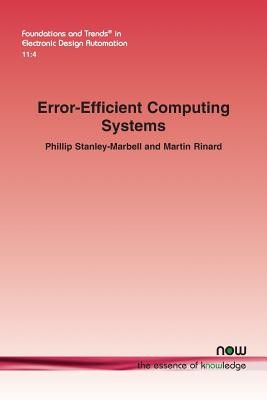
- We will send in 10–14 business days.
- Author: Phillip Stanley-Marbell
- Publisher: Now Publishers
- ISBN-10: 1680833588
- ISBN-13: 9781680833584
- Format: 15.6 x 23.4 x 0.6 cm, softcover
- Language: English
- SAVE -10% with code: EXTRA
Reviews
Description
Error-Efficient Computing Systems explores the theory and practice of techniques to make computing systems faster or more energy-efficient by allowing them to make controlled errors. In the same way that systems which only use as much energy as necessary are referred to as being energy-efficient, the class of systems addressed by this survey can be thought of as being error-efficient: they only prevent as many errors as they need to. The definition of what constitutes an error varies across the parts of a system and which errors are acceptable depends on the application at hand. In computing systems, making errors, when behaving correctly would be too expensive, can conserve resources. The resource conserved may be time: By making some errors, systems may be faster. The resource may also be energy: A system may use less power from its batteries or from the electrical grid by only avoiding certain errors while tolerating benign errors that are associated with reduced power consumption. The resource in question may be an even more abstract quantity such as consistency of ordering of the outputs of the system in question. Error-Efficient Computing Systems is an ideal reference for anyone interested in a holistic summary of the theory, practice, and history of how to make computing systems more efficient by trading errors for improved efficiency.
EXTRA 10 % discount with code: EXTRA
The promotion ends in 20d.17:04:30
The discount code is valid when purchasing from 10 €. Discounts do not stack.
- Author: Phillip Stanley-Marbell
- Publisher: Now Publishers
- ISBN-10: 1680833588
- ISBN-13: 9781680833584
- Format: 15.6 x 23.4 x 0.6 cm, softcover
- Language: English English
Error-Efficient Computing Systems explores the theory and practice of techniques to make computing systems faster or more energy-efficient by allowing them to make controlled errors. In the same way that systems which only use as much energy as necessary are referred to as being energy-efficient, the class of systems addressed by this survey can be thought of as being error-efficient: they only prevent as many errors as they need to. The definition of what constitutes an error varies across the parts of a system and which errors are acceptable depends on the application at hand. In computing systems, making errors, when behaving correctly would be too expensive, can conserve resources. The resource conserved may be time: By making some errors, systems may be faster. The resource may also be energy: A system may use less power from its batteries or from the electrical grid by only avoiding certain errors while tolerating benign errors that are associated with reduced power consumption. The resource in question may be an even more abstract quantity such as consistency of ordering of the outputs of the system in question. Error-Efficient Computing Systems is an ideal reference for anyone interested in a holistic summary of the theory, practice, and history of how to make computing systems more efficient by trading errors for improved efficiency.


Reviews